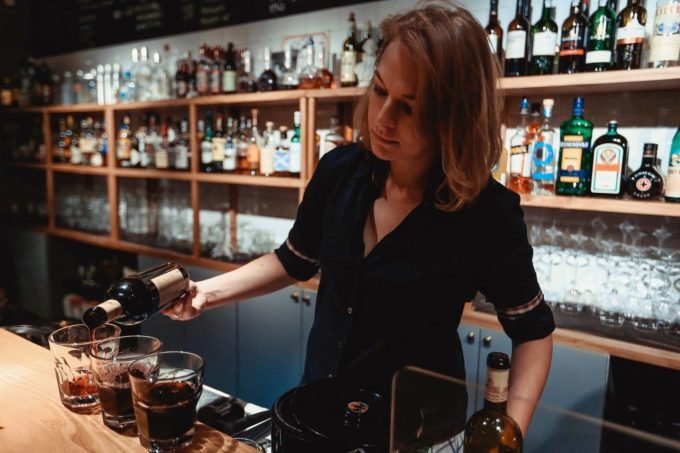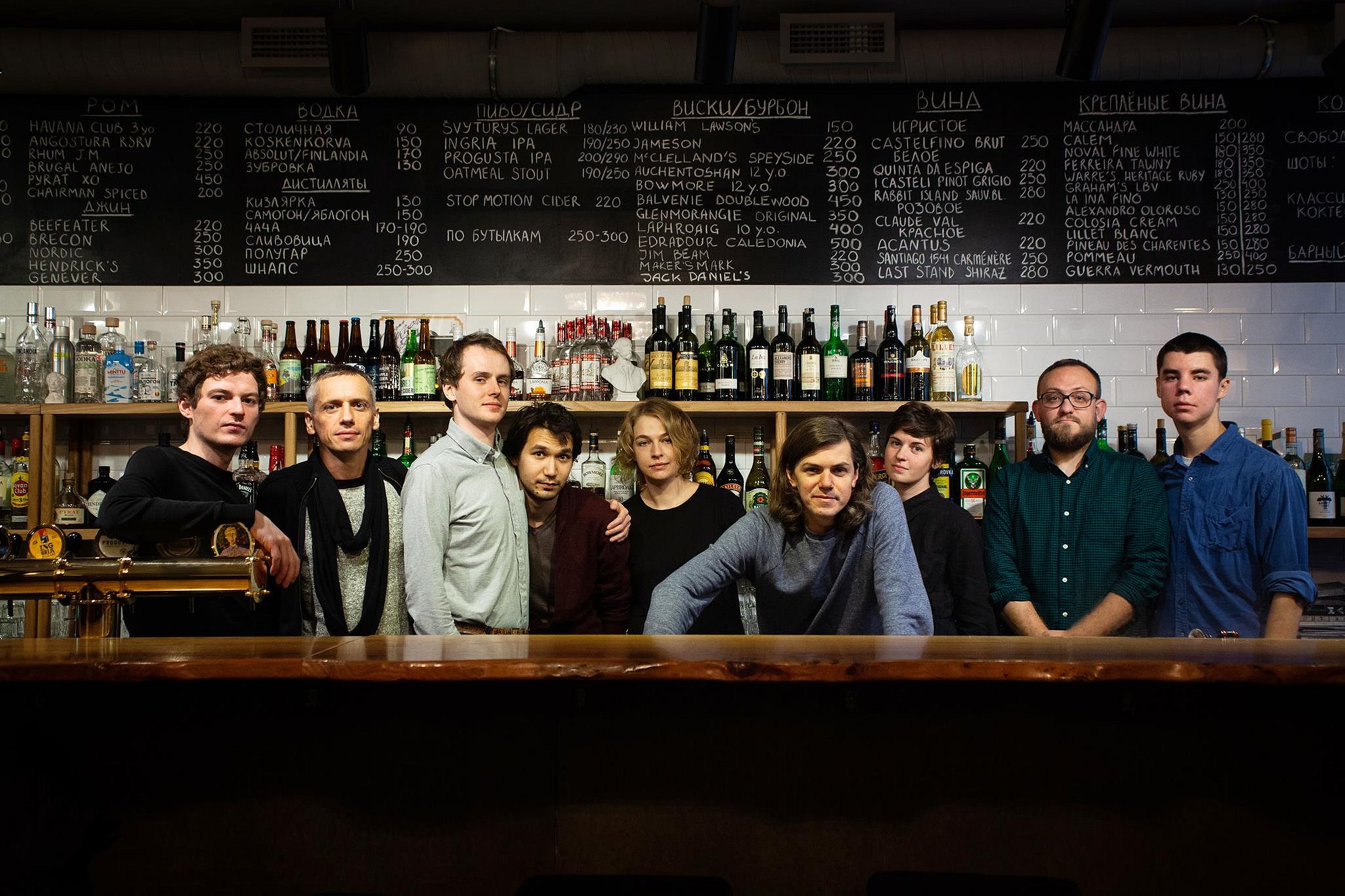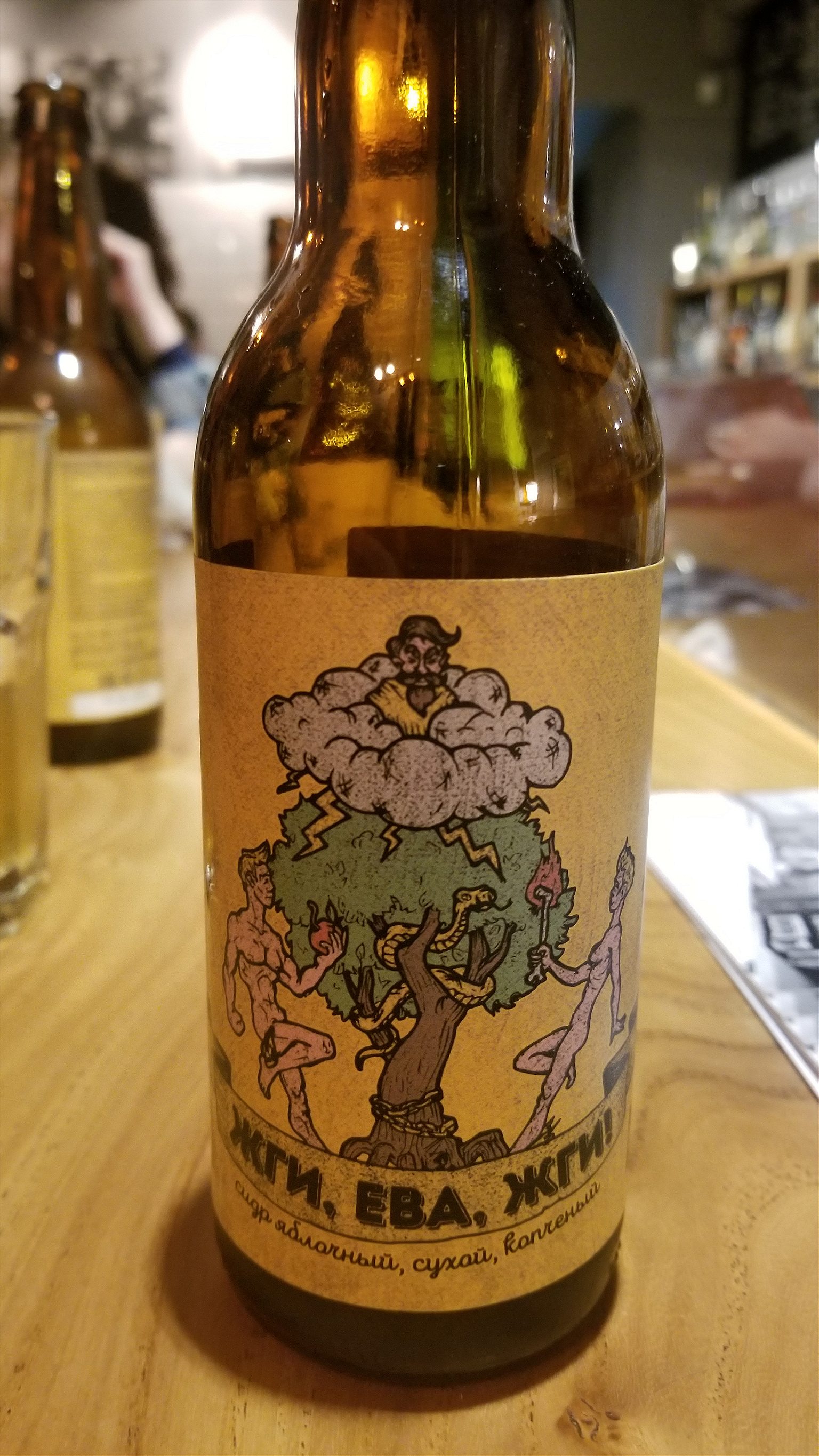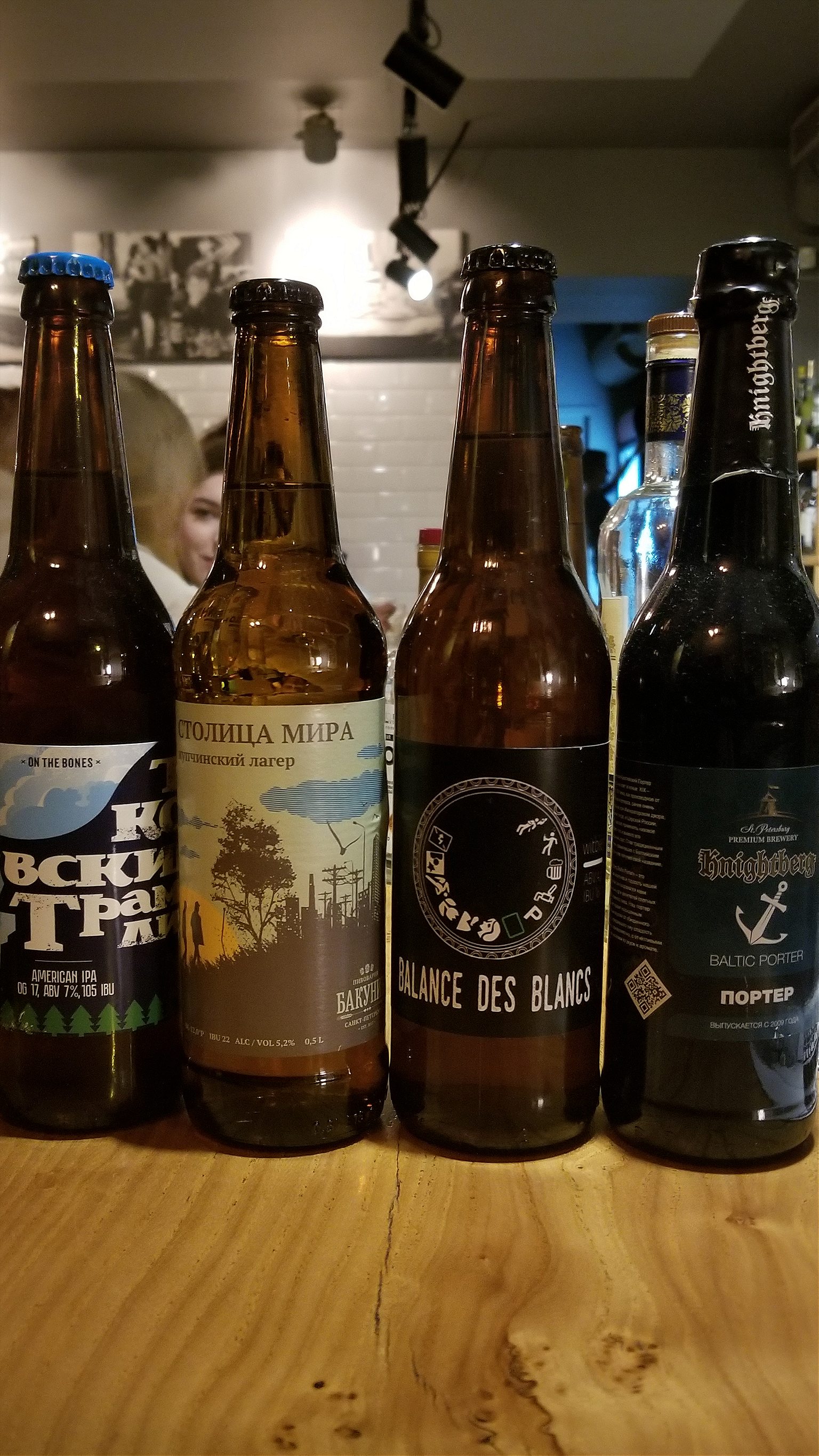
Here’s what it is like to own a bar in a city known for its drinking tradition

This week on The Trip, host Nathan Thornburgh talks to Asya Khramchenkova, owner of the phenomenal Bar Khroniki.
This week on The Trip: Drinking with Exceptional People Around the World podcast, host Nathan Thornburgh talks to Asya Khramchenkova, owner of the phenomenal Bar Khroniki. While sampling some limited-edition liquor, including a spirit distilled from caraway seeds, the two discuss how someone who used to work for an NGO got into the bar business, Khroniki’s distinct St. Petersburg vibe, and the pursuit of interesting alcohols.
Here is a transcript of the conversation. You can listen to the full episode, for free, on Apple Podcasts, Stitcher, Spotify, or wherever you get your podcasts.
Nathan Thornburgh: I met you at a bar last night. Your bar. I think it’s a very unusual place. So let’s start right there with the Bar Khroniki.
Asya Khramchenkova: Well, it’s a bar located in the central district of Saint Petersburg. I’m one of the three owners. There are three of us, me and my partners, Gleb and Peter. We founded the bar in 2013. So this autumn, hopefully, we’ll be celebrating five years.
Thornburgh: In bar years, that’s like at least 35 years old.
Khramchenkova: Well, it’s quite a lot for Saint Petersburg because the industry here is young and not every place which opens survives for five years. So, we’re really glad about it. We try to combine the vibe of a local bar in the central street of the city with the cultural heritage we treasure about the city, which is the drinking tradition. It’s a very important part of our identity that we are at the Saint Petersburg bar. I would say that this is a crucial thing about it.
Thornburgh: This bar could not happen in any other city.
Khramchenkova: I don’t think so.
Thornburgh: Some of that heritage that I thought was super interesting was the round table that you see immediately when you walk into the bar. Tell me about what that legacy is, which is a kind of a Soviet legacy, not a Petersburg one, but what was that stand up table about?
Khramchenkova: When we were talking about opening a bar and trying to figure out how should it look like and what it should offer people, we thought that in Russia, due to our very difficult 20th century.
Thornburgh: An understatement.
Khramchenkova: Yes. We don’t have like a smooth tradition of bars because the revolution happened and lots of other stuff happened and we tried to imagine what would a bar look like if there was a smooth transition from the 19th to the 21st century. And if this cultural culture has existed for the whole time, what would the Saint Petersburg would look like?
Thornburgh: So this is a bar where the 20th century never happened. Thank God.
Khramchenkova: Drinking culture in the Soviet Union is one of the strongest in the world. And during the time of the Soviet Union, there were no bars. There were only what I would describe as a shot bar: usually, quite small places where vodka was served by the glass. It wasn’t a place where you were supposed to spend a lot of time. So the point was that you could go there, have a quick shot, and then go on with your journey. It was very popular. And one of the central characteristics of this place was this standing table.
So when we were opening the bar, we decided that we should have at least one standing table because the bar counter is not always enough for everyone. In general, people in Saint Petersburg love to drink while standing. That’s a huge difference between Saint Petersburg and Moscow. People in Moscow usually prefer to sit down and eat while drinking, and people in Saint Petersburg stand and drink. They don’t eat that much.
Thornburgh: These are serious drinkers, professional drinkers. How’d you become a bar owner?
Khramchenkova: It’s a funny story. I used to work at an NGO, and I worked in child protection for six or seven years here in Saint Petersburg. And then I think I got burned out. I wanted to change something and a friend of mine, one of my current partners, he was working as a journalist and then started working at a bar in the evenings and we were talking about changing our lives because he was also bored with his press work and I couldn’t find anything to replace my NGO work which would inspire me. So, we started joking about opening a bar.
We kept returning to that subjects many, many times. Suddenly, in several months, we both realized that it’s a good time to start a business and that we’re pretty serious about the whole thing. Then we decided that we needed a third person to balance us out and also for the money because we counted our own resources and realized that we needed more. We invited our friend, Peter, who is also a journalist, and he joined us happily.

Thornburgh: Journalism can really be a drag sometimes, and you find yourself in bars a lot. Maybe, you know, think about opening a bar because it could work. And your bar has one house cocktail? Tell me about it.
Khramchenkova: We have one house cocktail. It’s called the ‘Free Ingria.’ It consists of vodka and cloudberry. And there are also some other secret ingredients.
Thornburgh: This is a small podcast. You can tell me.
Khramchenkova: Yeah, it turned out pretty well. People do like it. So, it’s the only signature cocktail we have.
Thornburgh: What does it mean to Free Ingria? Is it a call to arms or like, ‘Don’t tread on me?’
Khramchenkova: The statement is about independence from Moscow, or maybe independence from the rest of Russia. Here in the north, we have our own mind. We are a little bit on our own compared to the rest of Russia. Many people joke that Helsinki is much closer to Saint Petersburg than Moscow.
Thornburgh: Which is actually not a joke. Right?
Khramchenkova: It’s true. That’s an actual fact. So we tend to feel more in common with our northern neighbors than with our southern or western neighbors.
Thornburgh: So, let’s have a little tasting. I made Asya bring shot glasses from her bar along with the alcohol, and I felt like your bartender was not happy.
Khramchenkova: No, he was all right.
Thornburgh: Well, give him my apologies.
Khramchenkova: They also have shot glasses here. You just didn’t notice.
Thornburgh: I told you the Russians are heavy drinkers and are always prepared. So you brought three things for us to taste, and we’re going to see if we can make people listening feel some FOMO.

Khramchenkova: So the first thing I want to taste is an apple cider made here in Saint Petersburg. There is a group of five or six people that started collecting apples from their own dachas. Then they started collecting apples from friends. They offer to come and collect all the apples and pay them in cider.
Thornburgh: Really? If I had a lot of apples, that’s a deal that I would make.
Khramchenkova: Yeah, so it’s an absolutely local product and they make cider and different variations of cider from them. They’re called On the Bones. This particular cider is very interesting. It’s called Burn it Down, Eve.
Thornburgh: Very aggressive title.
Khramchenkova: It’s a smoked cider. So it’s really peaty. It’s unlike any other cider.
Thornburgh: The taste is pretty astonishing.
Khramchenkova: I think the secret is that the northern apples aren’t really very sweet on their own so they don’t get much sun and the weather is quite sad. It’s really very refreshing. It’s a limited edition, but hopefully, they’ll make it again.
Thornburgh: Oh, right. I should let people know that these alcohols we’re trying are utterly unavailable wherever you are unless you’re in St. Petersburg. Even then it’s probably hard to get. Alright, that was a success. What do we have at next?

Khramchenkova: We have an IPA. It’s a beer brewed in the Karelia in the northwest of Russia. So, this is proof that the craft beer revolution has landed not only in huge cities, but also in the provinces. They have their own language up there, so on every bottle, they put the name of the village the place is named after and the geographical coordinates. It’s quite bitter and it’s also quite heavy.
Thornburgh: Bitter and very strong. You said these are not city people, these are people from the provinces. Are they like hipster brewmasters? What’s their vibe and their motivation?
Khramchenkova: Well, I haven’t met the guys who brew with this. I think they probably are quite young and creative guys.
Thornburgh: Holy California Batman. That feels like a very international or like a west coast, dank, kind of weed, floral, IPA. These are all compliments.
Khramchenkova: I’m not a beer drinker, but I like this a lot.
Thornburgh: If I were sophisticated, I would give tasting notes. I feel like there’s some fruit in there. It’s a very complex flavor. What’s next?
Khramchenkova: Finally, this is a strong alcohol. What the Russians specialize in. It’s a distilled spirit made of caraway seeds.
Thornburgh: Caraway seeds?
Khramchenkova: Yeah. It’s also very super small batch. It’s made by a team close to the Estonian border. They started producing their own strong alcohols, which they distribute only in bars so you cannot find it in stores. They basically try to produce spirits from anything they could. They use wheat. They use apples of course, which we have plenty of. They use peas. They use buckwheat. They use whatever they can find.
Thornburgh: I know the Germans put caraway on bread sometimes, but I really don’t know a lot about caraway.
Khramchenkova: It’s quite commonly used in the kitchen of the northern countries. I think this is pretty good. It’s a very gastronomic drink. I can imagine it going very well with snacks, fish, meat, or with any pickled vegetable.
Thornburgh: I don’t know if I’m having some kind of like the Pavlovian connection between the flavor and bread, but to me, it tastes like a really rich and amazing pumpernickel. And it’s like fucking great. I’m very happy because it’s also strong alcohol, you know? I mean that’s why I think Khroniki is so great. This is a place that can actually deliver a very concentrated dose of a particular Russian region to you.
Khramchenkova: Well, we tried to search out the best among the all the possibilities our region has to offer and I think it’s the right strategy for any bar to try to show the best that they can find.
Thornburgh: And you have. I cannot thank you enough. You’ve donated a sober day and I appreciate it.
Khramchenkova: Thank you. Hope to see you in Khroniki again.
This conversation was edited and condensed. Listen/subscribe to the podcast on Apple Podcasts, Spotify, or Stitcher.
You can listen to the full episode, for free, on Apple Podcasts, Stitcher, Spotify, or wherever you get your podcasts.
Up Next
Medellín, expressed in hip hop
I Was Born in Luanda
Cláudio Silva reflects on moving from Angola to the United States as a child, founding Angola’s largest food and travel platform, and what the country’s current flourishing means not just for Angolans but for the world.
Roaming author, comedian, musician Jennifer Neal on calling Berlin home
Author, musician, and comedian Jennifer Neal on her journey from the US to Japan to Australia to Germany, her experiences as a Black woman abroad, and the perils of jaywalking in Germany.
Gary Hirshberg: Organic Power
This week on The Trip podcast: Stonyfield Farms Chairman Gary Hirshberg talks sustainability, politics, and the role of money in the US elections.
Wanuri Kahiu: Banned (and Beloved) in Kenya
This week on The Trip podcast: Director Wanuri Kahui on her joyous battle for Kenya’s soul.






